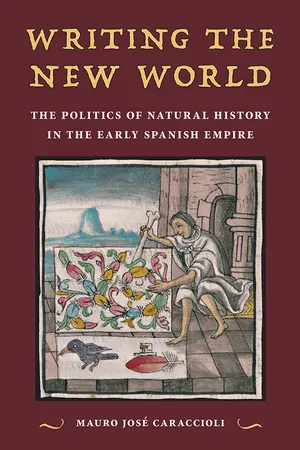
Writing the New World
The Politics of Natural History in the Early Spanish Empire
- English
- ePUB (mobile friendly)
- Available on iOS & Android
Writing the New World
The Politics of Natural History in the Early Spanish Empire
About this book
International Studies Association Theory Section Best Book Award
Finalist, Environmental Humanities Category , ACLS Open Access Book Prize and Arcadia Open Access Publishing Award
In Writing the New World, Mauro Caraccioli examines the natural history writings of early Spanish missionaries, using these texts to argue that colonial Latin America was fundamental in the development of modern political thought. Revealing their narrative context, religious ideals, and political implications, Caraccioli shows how these sixteenth-century works promoted a distinct genre of philosophical wonder in service of an emerging colonial social order.
Caraccioli discusses narrative techniques employed by well-known figures such as Gonzalo Fernández de Oviedo and Bartolomé de Las Casas as well as less-studied authors including Bernardino de Sahagún, Francisco Hernández, and José de Acosta. More than mere catalogues of the natural wonders of the New World, these writings advocate mining and molding untapped landscapes, detailing the possibilities for extracting not just resources from the land but also new moral values from indigenous communities. Analyzing the intersections between politics, science, and faith that surface in these accounts, Caraccioli shows how the portrayal of nature served the ends of imperial domination.
Integrating the fields of political theory, environmental history, Latin American literature, and religious studies, this book showcases Spain’s role in the intellectual formation of modernity and Latin America’s place as the crucible for the Scientific Revolution. Its insights are also relevant to debates about the interplay between politics and environmental studies in the Global South today.
This book is freely available in an open access edition thanks to TOME (Toward an Open Monograph Ecosystem)—a collaboration of the Association of American Universities, the Association of University Presses, and the Association of Research Libraries—and the generous support of Virginia Tech.
Frequently asked questions
- Essential is ideal for learners and professionals who enjoy exploring a wide range of subjects. Access the Essential Library with 800,000+ trusted titles and best-sellers across business, personal growth, and the humanities. Includes unlimited reading time and Standard Read Aloud voice.
- Complete: Perfect for advanced learners and researchers needing full, unrestricted access. Unlock 1.4M+ books across hundreds of subjects, including academic and specialized titles. The Complete Plan also includes advanced features like Premium Read Aloud and Research Assistant.
Please note we cannot support devices running on iOS 13 and Android 7 or earlier. Learn more about using the app.
Information
Table of contents
- Cover
- Title Page
- Copyright Page
- Dedication
- Epigraph
- Contents
- List of Illustrations
- Acknowledgments
- Opening: Of Nature and Other Demons
- 1. Narratives of Conquest and the Conquest of Narrative
- 2. Oviedo, Las Casas, and the Difference That Made Nature
- 3. The Anthropolitics of Bernardino de Sahagún
- 4. The Imperial Renaissance of Francisco Hernández
- 5. José de Acosta and the Ends of Empire
- Epilogue: Toward a Natural History of Colonial Domination
- Notes
- Bibliography
- Index
- About the Author